8 Best Ecwid Alternatives & Competitors (2024 Comparison)

Welcome to our comparison of the best Ecwid alternatives.
Ecwid is one of the most popular ecommerce solutions out there—but it isn’t perfect. And it isn’t the right choice for every online business.
In this post, we’ll be looking at some of the best Ecwid alternatives and competitors on the market that you might want to use instead.
We’ll tell you everything you need to know about each ecommerce platform, discuss their pros and cons, and explore how they compare to Ecwid.
The best Ecwid alternatives compared
Short on time? Here’s a rundown of our top picks:
1. Sellfy
Sellfy is our overall favorite Ecwid alternative. It’s a super beginner-friendly ecommerce platform that comes with most of the same stuff you get on Ecwid, plus a bunch of features you don’t.
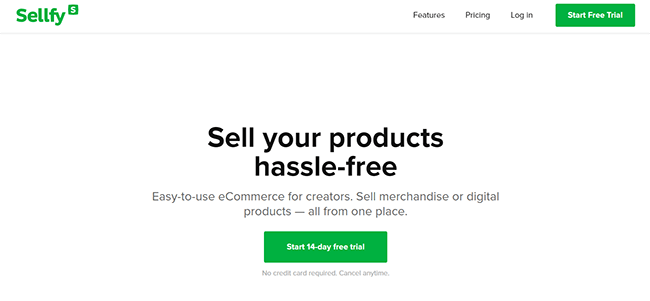
The best thing about Sellfy is how easy it is to use. You just sign up, upload your products, connect a payment processor (Stripe or PayPal), and you’re ready to start selling. You can sell all sorts of products, including physical goods, digital products, and even subscriptions.
But unlike Ecwid, Sellfy also lets you sell print-on-demand products with no third-party integrations required.
You can just upload your custom designs to blank products in Sellfy’s POD catalog and add them to your store. Then when customers purchase them, Sellfy handles fulfillment for you by automatically printing and shipping them.
This is a game-changing feature for artists and creators who want an easy way to sell their designs without having to hold stock.
And that’s not the only advantage Sellfy has over Ecwid.
Ecwid, Sellfy also lets you sell unlimited products on any plan—so your product catalog can be as big as you want and you won’t have to pay any extra. In comparison, Ecwid only offers unlimited products on its highest-priced plan (which is very expensive).
Plus, Sellfy also comes with some powerful marketing features, like email marketing, upsells, tracking pixels, discount codes, etc.
Key features
- Website builder
- Digital products
- Physical products
- Print on demand
- Subscriptions
- Video streaming
- Shopping cart
- Email marketing
- Upselling
- Embeds
- PayPal & Stripe integration
Pros
- Easy to use
- Unique features (like print on demand fulfillment)
- Unlimited products on all plans
- Nice UI
Cons
- Sales revenue limits ($10k – $200k depending on the plan)
- Limited payment processor integration (PayPal and Stripe only)
Pricing
Plans start at $29/month, save $84 when you sign up for a yearly plan. Get started with a 14-day free trial.
Read our Sellfy review.
2. Shopify
Shopify is a platform that needs no introduction. As the most popular (and overall best) hosted ecommerce solution in the world, it’s the best Ecwid alternative for serious businesses.
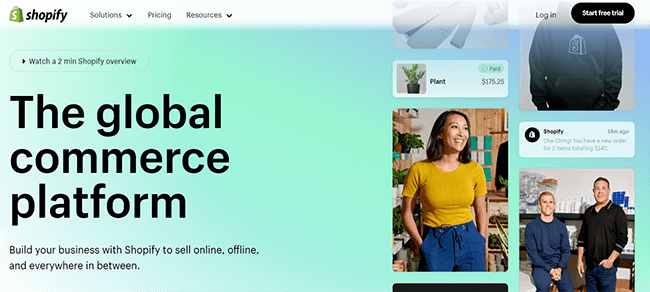
Both Shopify and Ecwid allow users to create their own online store and manage inventory, orders, etc. with ease. But there are a couple of things that make Shopify stand out.
First off, it’s incredibly flexible and scalable thanks to the Shopify App Store.
There are 8,000 third-party add-ons in the App Store (that’s much more than Ecwid) which you can install on your site in a couple of clicks to instantly extend its functionality. This makes it easy to set everything up exactly the way you want it.
Plus, it also offers unlimited products and sales on all plans, so there’s no limit to your growth.
Shopify also has the edge when it comes to store customization thanks to its excellent, intuitive drag and drop builder. It gets top marks for SEO too, and its checkout converts like crazy.
There’s really only one thing I don’t like about Shopify, and that’s its transaction fees. Shopify basically strongarms users into using Shopify Payments (their in-house payment gateway) by charging additional fees of 0.5% – 2% if you use a third-party provider (like Stripe) instead.
Key features
- Site builder
- Order management
- Shipping tools
- Inventory management
- App store
- POS system
- Shopify Inbox
- Themes and templates
- Marketing tools
Pros
- Flexible and scalable
- Unlimited products and sales
- Huge app store
- Fast and reliable
- High-converting checkut
Cons
- Transaction fees for third-party payment gateways
Pricing
Plans start from $5/month, and discounts are available when you pay annually. Get started with a 3-day free trial, then $1/month after for 3 months.
Read our Shopify review.
3. Squarespace
Squarespace is a simple but powerful website builder with ecommerce functionality. It stands out for its best-in-class website templates.
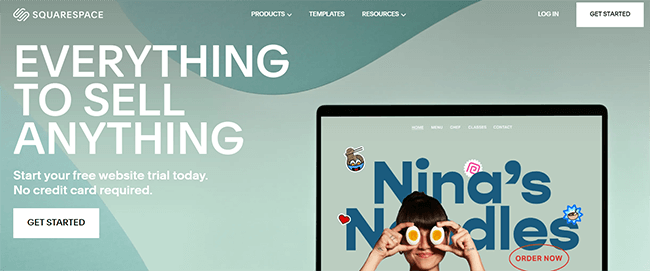
Squarespace is best known as an all-purpose website builder. Most people use it to create regular sites, but it has some pretty powerful ecommerce features too.
If you sign up for one of their Commerce plans, you’ll get access to everything you need to sell products online: order management, flexible shipping options, simple payment and checkout options, tax tools, etc. There’s even a built-in appointments scheduling tool and a bunch of useful marketing features.
But our favorite thing about Squarespace is its templates.
It has a huge catalog full of professionally-designed templates for every use case, and they all look really nice. It’s a welcome change from the generic, dated free themes and templates you often see on other platforms.
Key features
- Store builder
- Store templates
- Order management
- Flexible shipping
- Tax tools
- Appointments
- Integrations
- Social media features
- Analytics
- Automations
- SEO tools
- Email marketing tools
Pros
- Best-in-class templates
- Excellent design tools
- Easy to use
- Good ecommerce features
Cons
- Transaction fees on certain plans
- Not a dedicated ecommerce platform
Pricing
Plans start at $23/month, save 30% when you pay annually. Transaction fees apply on certain plans. Try it free for 14 days.
4. Weebly
Weebly is another all-purpose website builder with ecommerce features. It’s very affordable and easy to use, which makes it a good choice for beginners, solopreneurs, and small businesses.
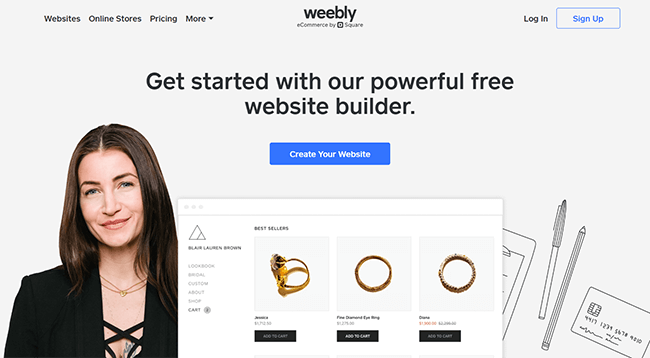
Weebly offers some of the cheapest monthly subscription plans you’ll find anywhere. Its entry-level plan is almost 3x cheaper than Ecwid’s, for example, and its free plan is very generous too.
But despite the low price tag, Weebly is still a powerful platform.
It has a good set of ecommerce features including an integrated shopping cart, support for different product types (digital goods, physical products, etc), inventory management tools, automatic tax and shipping calculations, coupons, item badges, and more.
Its themes library is great too. All templates have been created by professional designers, and they look super polished.
You create your site using the drag-and-drop builder and you have a lot of cool customization options. For example, you can make your site stand out with parallax and reveal animation effects, or add dynamic design elements like video backgrounds to keep visitors engaged.
My one gripe? You can only accept payments through PayPal on the Performance plan (the highest-price plan tier). Other important features like abandoned cart emails and item reviews are also only available to Performance users.
Key features
- Drag and drop builder
- Video backgrounds
- Animations
- Store themes
- Analytics
- Marketing
- Vouchers and discounts
- Square integrations
- Shopping cart
- Order management
Pros
- Great value for money
- Great store builder
- Easy to use
- Nice templates
Cons
- Performance plan is required for PayPal payments
Pricing
Free plan available. Paid plans start at $13/month or $10/month billed annually.
5. Wix
Wix is another excellent, beginner-friendly Ecwid alternative. Like Weebly and Squarespace, it’s another multi-purpose website builder that doubles up as an ecommerce platform
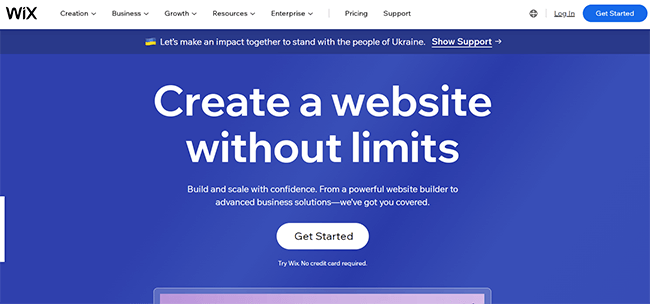
Wix is a good option for beginners who want a fast, easy way to build their first store. It makes the whole setup process quick and painless so you can get started quickly.
All you have to do is choose what kind of site you want to make, then pick a template that fits the kind of style you’re looking for. After that, open it up in the intuitive Wix Editor and drag and drop thousands of pre-built widgets and design features to customize it.
After that, you can add your products and get everything ready to start selling. And once you’ve finished, publish your site and start driving traffic using the integrated marketing and advanced SEO tools.
To make things even easier, if you don’t want to customize your site yourself, you can use Wix’s ADI (Artificial Design Intelligence) system to automate the process. It builds a personalized ecommerce site just for you based on your answers to simple questions.
Wix also has all the usual features you might look for in an ecommerce solution, like a great streamlined checkout, lots of payment processing options, abandoned cart recovery, etc.
Key features
- Wix Editor
- Pre-built widgets
- Marketing tools
- SEO
- Ecommerce features
- ADI
- Payment processor integrations
Pros
- Easy to use
- Quick setup process
- Affordable
- ADI system is a nice feature
Cons
- Lacks some advanced features
- More geared towards regular sites than ecommerce stores
Pricing
Business and eCommerce plans start from $23/month. Get started with a 14-day free trial.
6. BigCommerce
BigCommerce is a popular, all-in-one ecommerce software solution that’s packed full of powerful features. It’s a versatile platform that’s suitable for both small online sellers and big-name brands.
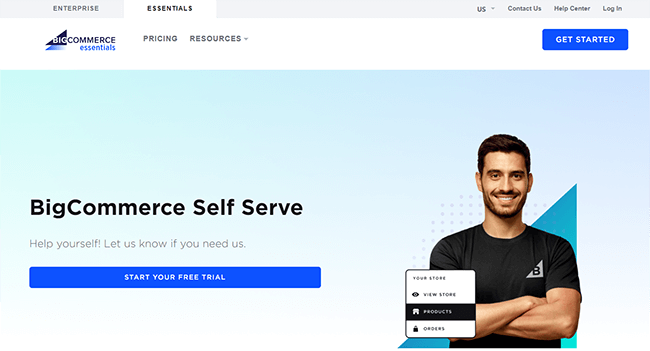
BigCommerce separates its products into two service offerings: BigCommerce Enterprise and BigCommerce Essentials.
Their Essentials plan is designed for small- and medium-sized businesses and entrepreneurs and strikes a good balance between affordability and features.
It has all the usual features you’d expect (a drag-and-drop site builder, templates, checkout, order & inventory management, etc.) plus a bunch of stuff you don’t often get with other platforms.
For example, BigCommerce is one of the only ecommerce providers that lets you create and manage multiple online stores (3 to 8, depending on the plan you sign up for) from one dashboard.
It also offers multi-currency right out of the box, so you can accept payments in over 100 currencies and offer local payment methods to your customers. This is something you don’t get on Ecwid.
And it’s also one of the only platforms that come with a built-in blog, which is really useful if you plan on driving traffic through SEO. You can publish blog posts to your BigCommerce site that drive organic search traffic and get more shoppers to visit your store.
BigCommerce supports a wide range of payment processing options and doesn’t charge any additional transaction fees regardless of which gateway you use.
Key features
- Site builder
- Templates
- Order management
- Inventory management
- Multi-currency
- Multi-store
- Blogging tools
- SEO
- Marketing features
- Payment processor integrations
Pros
- Broad feature set
- Great for SEO
- Supports multiple stores & currencies
- Advanced features
Cons
- No free plan
- Not as easy to use as some alternatives
Pricing
Plans start at $39/month, save 25% when you pay annually. Get started with a 15-day free trial.
7. Volusion
Volusion is an online selling platform and ecommerce site builder that stands out for its stellar marketing tools, rich analytics, and wide range of supported integrations.
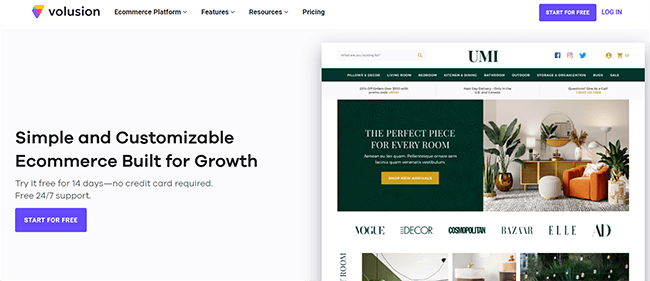
With Volusion, you can build a beautiful, functional ecommerce site in under 10 minutes, with no coding required.
It works like most other platforms: Start by choosing from Volusion’s selection of free and premium, responsive website themes, then customize them in the intuitive site builder. There are pre-made content blocks for things like social media links, image galleries, testimonials, etc. to make it quick and easy.
All Volusion pages load lightning-fast, which is important for SEO. And speaking of SEO, Volusion gives you complete control over your meta descriptions, title tags, URLs, etc.
Once you’ve built your site, you can start selling with ease thanks to its powerful ecommerce features. It has all the selling tools you need: shopping cart software, inventory management, unlimited product options, etc.
To help you expand and scale your store, Volusion gives you access to a ton of marketing tools. You can set up newsletters, manage customer queries and sales tickets through the built-in CRM, market your store on social, and more.
And you also get access to really robust analytics to track your growth over time. It gives you insights into every aspect of your sales performance including metrics like purchases, live carts, abandoned carts, ROI, etc.
Key features
- Store builder
- Themes
- Shopping cart
- Inventory management
- Unlimited product options
- SEO
- CRM
- Social selling
- Newsletters
- Analytics
Pros
- Easy to use
- Fast and reliable
- Great marketing features
- Excellent analytics
Cons
- No free plan (only free trial)
- A bit pricey
Pricing
Plans start at $35/month, save up to 10% when you pay annually. Get started with a 14-day free trial.
8. Shift4Shop
Last but not least, we have Shift4Shop—a turnkey ecommerce solution that gives you everything you need to sell online, for free.
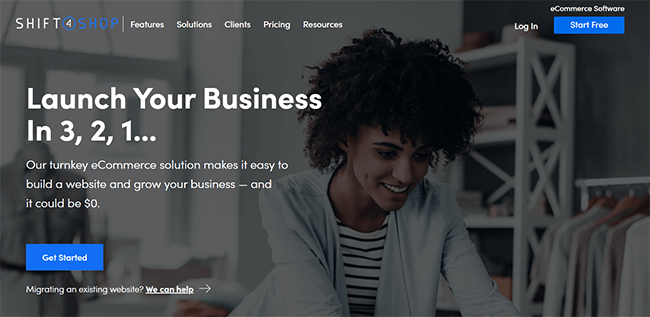
Yes you heard that right, Shift4Shop is one of the only platforms out there to offer an all-inclusive free plan that gives you complete access to everything you need to start selling.
For $0/month, you get access to the website builder, all the ecommerce features, all the marketing features, plus unlimited products, unlimited bandwidth, no revenue caps, free domain name, free website themes, and much much more.
The catch? You have to use Shift4 to take payments—that’s Shift4Shop’s in-house payment processor.
If you want to use a third-party gateway like PayPal, you’ll need to pay the regular monthly subscription price.
Unfortunately, the end-to-end free plan is also only available to merchants in the US.
But if you’re not from the US, or you don’t want to use Shift4 Payments, it’s still worth considering signing up for one of the paid plans as the platform has some really advanced features.
Key features
- Store builder
- Themes
- Product categories
- Order management
- Shift4 payments
- Abandoned cart recovery
- SEO tools
- Blogging
- Social media tools
- Ad management
- Secure hosting
Pros
- Free end-to-end plan
- Very advanced
- Feature rich ecommerce platform
- Good selection of themes
- Easy to use
Cons
- Only free if you use Shift4
- Free plan only available to US merchants
Pricing
End-to-end free plan available to US merchants with Shift4 payments. Paid plans start from $29/month.
Ecwid alternatives FAQs
Before we wrap up, here are the answers to some frequently asked questions about Ecwid.
What is Ecwid used for?
Ecwid (short for ecommerce widget) is a platform that you can use to start selling products online.
It gives you all the tools you need to manage your ecommerce operations, like inventory management, order management, checkout, payment processor integration, etc.
Some people use Ecwid to build their entire online store from scratch, while others connect it to their existing website in order to add ecommerce functionality.
What are the limitations of Ecwid?
While Ecwid is a great platform in many ways, it does have its drawbacks. Here are a few of the main limitations we’ve noticed:
- Product limitations. Ecwid limits you to 5 products on the free plan, 100 on the Venture plan, and 2,500 on the Business plan. An unlimited plan is available, but it’s fairly expensive.
- No native multi-currency support. If you want to display prices in your ecommerce store in multiple currencies, you’ll need to use a paid third-party app and integrate it with Ecwid. In comparison, some Ecwid alternatives offer multi-currency selling out of the box.
- No dropshipping or POD. If you want to sell print-on-demand products with Ecwid (or start dropshipping) you’ll again need to rely on a third-party app, whereas Sellfy offers POD out of the box.
- Poor SEO functionality. Ecwid doesn’t give you a lot of control when it comes to the SEO side of things. For example, it doesn’t let you change image alt text, edit URLs, or set up 301 redirects.
How many items can you sell on Ecwid for free?
Ecwid’s free plan only lets you sell up to 5 physical products (though this may vary by country). You also can’t sell digital goods on the free plan.
How much does Ecwid charge per sale?
Ecwid is one of the few ecommerce platforms that doesn’t charge any transaction fees on sales—even on the free plan.
However, while the platform itself doesn’t charge transaction fees, you may still incur transaction fees from your payment processor. That includes Lightspeed Payments.
Is Ecwid as good as Shopify?
That comes down to your personal preferences.
There are certain things Ecwid does better than Shopify. For example, it offers a great free plan and doesn’t charge additional transaction fees when you use third-party payment gateways.
But in our opinion, Shopify still has the edge over Ecwid thanks to its excellent, beginner-friendly UI, advanced features, huge app store, better SEO, and advanced feature set. Shopify also seems to be much more scalable and offers unlimited products on all plans.
Final thoughts
That concludes our roundup of the best Ecwid alternatives.
We hope you found an ecommerce solution that fits your needs in this list. If you’re still not sure which one to choose, here’s what we recommend:
- Choose Sellfy if you’re new to ecommerce or creator/artist. It’s fantastically easy to use, has no transaction fees, and comes loaded with powerful features (including print-on-demand fulfillment).
- Go with Shopify if you’re a bigger brand or you just want the overall best ecommerce platform. It’s fast, infinitely scalable with a huge app store, and has a fantastic checkout.
If you’re not sold on any of the alternatives in this list, you can find more options in our roundup of the best ecommerce platforms.
And to learn more about the state of online shopping this year, check out these eye-opening ecommerce statistics.
Disclosure: Our content is reader-supported. If you click on certain links we may make a commission.
